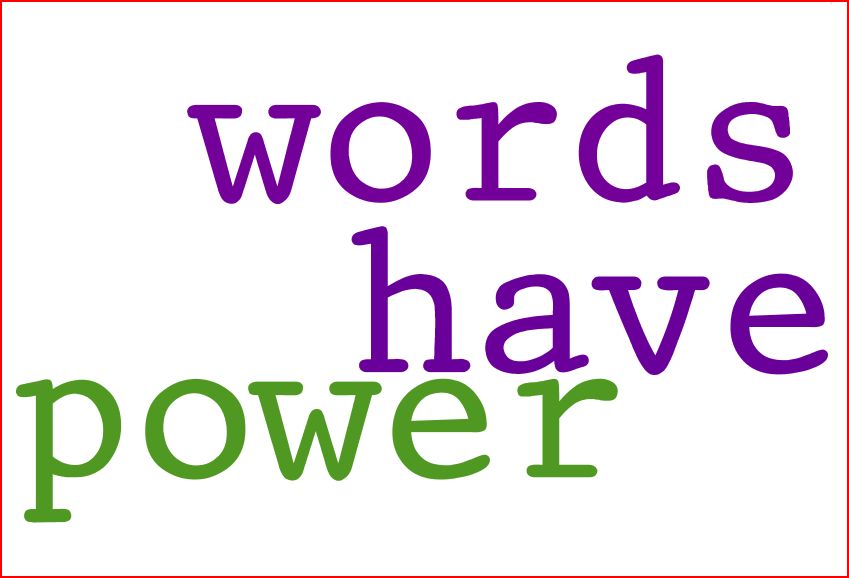 Words and thoughts have their own energy, including self-talk. Everything you think and say affects the way you feel and the energy you send out.
Words and thoughts have their own energy, including self-talk. Everything you think and say affects the way you feel and the energy you send out.
Try this little exercise. Read the paragraph below. Repeat it several times. It might be a little overboard, but it’ll help you get the point.
“I’m so useless and pathetic. I can’t seem to do anything right. I can’t ever get enough done! I don’t know what’s wrong with me! I have every reason in the world to be happy and I can’t even seem to do that! I have so many things I need to get done and I’m not near as organized as I should be! I just don’t have what it takes to be a success! Other people are so much better than me. Gee, with my luck, I hope the plane I’m going on next week doesn’t crash.”
How does it make you feel? Notice the reactions in your body. How does it affect your mood?
Now read the following paragraph to yourself several times:
“I am so proud of myself. I put my best effort into work today, and I know I did a great job. I’m so grateful for all the wonderful people around me, and I really appreciate all the little things in my life. I’ve accomplished so many things today. I’m so thankful for my physical health and all the energy I have to get so much done each day! What a beautiful day it is outside today! I feel great! And I’m really excited about that plane trip next week.”
How does it make you feel? Notice the sensations and reactions in your body. How does it affect your mood?
Can you feel the difference?
Do you know what your self-talk is saying to you?
We have conversations in our mind 24/7 but we’ve become so used to them that we barely even notice what they are saying. We often assume that our thoughts are more positive than they really are. After all, we don’t want to think of ourselves as a NEGATIVE, UNAPPRECIATIVE COMPLAINER.
The truth is that we do tend to accumulate many negative beliefs and fears about ourselves and we do fill our mind with lots of negative, complaining thoughts that don’t serve us well.
This negative self-talk can be streaming through your mind way more often than you realize.
Some Main Points About Self Talk
- Our inner talk is almost constant and most of the time we don’t even notice it.
- Our subconscious mind listens to everything we say to ourselves and it affects the way we feel and the actions we take.
- We often don’t try to create this inner talk, it just happens on auto-pilot.
- The majority of our self-talk is negative rather than positive.
- It can happen so quick, and one thought just keeps leading to another.
- Negative self-talk attracts more negative self-talk.
- The feelings and emotions produced by our inner talk can lead to anxiety, depression, sadness, lack of motivation, procrastination, and low self-worth.
- The subconscious mind accepts all of our self talk as the truth, even when it’s a lie.
Positive, happy thoughts have a high vibrational frequency, while the energy of negative thoughts has a much lower vibration.
Our vibration affects how we feel. Negative vibrations lead to feelings of frustration, overwhelm, anger, and unhappiness. Positive vibrations lead to positive feelings such as happiness, joy, peace and calm.
The way we feel affects the feelings of the people who are in our presence. They pick up on the energy that we are sending out.
We are Responsible for How We Feel
It is the thoughts we think in response to certain situations and events that determines how we feel, not the external situation itself. It can be really hard to accept that it’s our thoughts that lead to so many of our feelings.
If someone criticizes me, my immediate thoughts could be, “Well they obviously think I’m useless, and they don’t like me. I’m never good enough. Seems I can’t do anything right.”
Those thoughts would make me feel pretty bad about myself and my value, and the way I feel would appear to be their fault.
But what if my thoughts had been different? What if I thought “Okay, point taken. Maybe I could have done that better. I did the best I knew how at the time. I’m sure they weren’t trying to hurt me. I can appreciate how they feel and I’ll learn what I can from the situation moving forward.”
These thoughts would have a completely different effect on my mood.
As hard as it is, when you realize and accept that you are responsible for how you feel (except of course, if you have a physiological or psychological imbalance), you can then begin to change your outlook on life. This is very empowering!
We Can Learn to be in Control of our Self Talk
The great news is our mind is completely retrainable!
You can learn to change your thoughts!
As Louise Hay says: “It’s only a thought, and a thought can be changed.”
My self-talk over the years has definitely been upgraded. It’s made a huge difference in how I feel about myself and how I interact with other people. It’s helped me to feel more confident and secure in myself and to be more appreciative and content in life. It helps other people to feel more comfortable in my presence.
So, I know it can be done. I’ve taught myself to be more aware of my thoughts, so I can detect it when I go into “negative” self-talk and take corrective measures.
The definition of mindfulness is “Paying Attention on Purpose, nonjudgmentally in the present moment.”
Begin to pay attention to your inner self-talk. Jot down some of the thoughts you are saying to yourself. Recognizing and acknowledging them can help take away some of their power. Don’t judge yourself for thinking them. Just become aware of them and continually choose to “let them go.”
Think of holding a pen very tightly in your hand, and then open your hand and let it drop. Repeat that visualization with the self-talk that doesn’t serve you. Let it go.
It’s like a “catch and release” plan. The more mindful you become of the thoughts in your mind and the more you practice releasing them, the better you will get at it!



